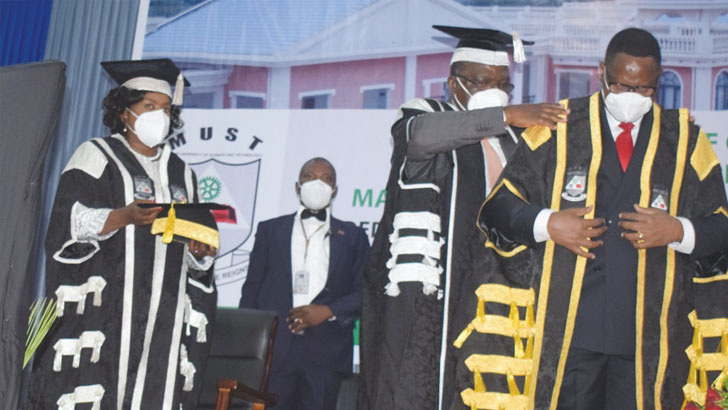Unima delinking to foster human capital development
President Lazarus Chakwera says the recent delinking of the University of Malawi (Unima) into three autonomous universtities is part of implementation of one of the seven enablers of Malawi Vision 2063 (MW2063) on human capital development.
The President said this yesterday when he presided over Malawi University of Science and Technology’s (Must) second cohort graduation at Ndata in Thyolo District.
Following Unima’s delinking on May 4, Chancellor College became University of Malawi, The Polytechnic became Malawi University of Business and Applied Sciences (Mubas) while College of Medicine and Kamuzu College of Nursing merged to form Kamuzu University of Health Sciences (Kuhes).
In his speech, Chakwera also stressed that the creation of the new universities is not merely a solution to the common shortage of admission space, which has been a challenge in previous years.
He said: “Underpinning the work of developing human capital is our belief that before we can create a new kind of country, we must create a new kind of citizen, one capable of desiring, envisioning and building a future that is better than the past.
“And when it comes to developing human capital, especially en masse, nothing does the trick like tertiary education. Now, as a champion for education, I advocate for the development of all our people’s natural talents through education in all disciplines.”

Chakwera also pointed out that Science, Technology, Engineering and Mathematics (Stem) graduates from universities like Must are integral in the collective pursuit of MW 2063, adding that there is no pillar among the three pillars of MW2063 that does not call on Stem graduates to rise to the occasion.
Among others, the three pillars entail the creation of inclusive wealth and self-reliance in increasing productivity, commercialising the agriculture sector, and industrialisation to ensure value addition and urbanisation.
While stressing that there is need for Stem graduates to turn their education into bankable enterprises, the President said the possibilities for all Malawians educated in science and technology are endless because there is no sector that does not need technical expertise.
He said: “The vast opportunities available to educated Malawians is the reason why in my State of the Nation Address during the opening of Parliament six days ago, I named the development of human capital through education as one of the accelerators of my administration’s drive to create jobs, create wealth and create food security.”
Chakwera also challenged the graduates to be useful in the project to build a new Malawi.
In her speech, Must vice-chancellor Professor Address Malata challenged the graduates to be innovative and professional, stressing that character is key to success.
She also said the university has been expanding its external engagements with both public and private universities within and outside the country which has made it possible for the institution to gain more platforms in their innovations, among others.
The MW2063 lists human capital development as enabler number five and, among others, states that there shall be quality access to infrastructure for science, technology and innovation (STI), including equipping academic institutions with world-class laboratories.
It further states that Stem shall be strengthened as a key to innovation and job creation and that levels of secondary and tertiary education will be enhanced.
“We shall be a highly knowledgeable people with relevant quality education that incorporates a strong element of academic excellence and technical and vocational skills fit for the labour market, entrepreneurship and implementation for the vision,” reads MW2063 in part.
But in an interview yesterday, education policy expert Steve Sharra said while Chakwera poignantly l i n ked science and technology to all the three pillars of MW2063, the arts and humanities and social sciences must also be a part of completing the equation.
He said education lies at the centre of developing human capabilities requisite to achieving the vision, but the bigger argument is about extending education opportunities in the technical and human skills to as many Malawians as possible.
“This is the biggest challenge facing the country and the long-term agenda we have set for ourselves. The proportion of Malawian youths who have been denied that education opportunity is staggering. We have 84 percent of our 14-17 years who are not in school.
Said Sharra: “Our tertiary enrolment rate is 0.8 percent and only three percent of Malawian adults have acquired a tertiary education. More than 70 percent of Malawian adults do not have any educational qualification. This is a sad predicament. But we are laying the foundation to changing things.”
He said in that regard, widening access to education is the first giant step towards achieving the desired Malawi, adding that there is need to think creatively and unconventionally to identify trillions of kwacha needed to educate more people.
During the ceremony, Chakwera was also installed as Must chancellor, becoming the second chancellor of the university since its inception.
Immediate-past president Peter Mutharika was the institution’s first chancellor.





